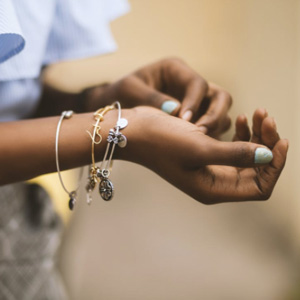
As states open back up for business in the midst of the COVID-19 pandemic, the Centers for Disease Control and Prevention (CDC) has published various guidelines designed to make shopping safer for consumers and retail workers.
Though jewelry stores aren’t addressed specifically in these guidelines, many of the recommendations apply to the jewelry-shop setting. Jewelers can also take cues from major department stores when instituting new safety measures.
Here are some precautions to take (this is not a complete list):
++ The virus is thought to spread mainly from person-to-person, between those who are within six feet of each other, so remind staff and shoppers that your store is maintaining social distancing protocols.
Retailers including Macy’s and Nordstrom are installing plexiglass at their registers—something you may want to consider. The CDC notes that infection spreads through respiratory droplets produced when an infected person coughs, sneezes, or talks.
++ Wear nonmedical face masks, and provide masks for customers who want them.
++ Macy’s is requiring that customers use hand sanitizer, which they are providing, before they touch and try on jewelry and watches. Make it a requirement in your store too.
++ Don’t assist consumers with try-ons. This may be challenging for sociable salespeople, who are used to getting up close to their clients to help latch a necklace or fasten an earring. But doing those things breaks social distancing recommendations and puts both parties at risk. Brainstorm and role-play socially distanced ways to get around this requirement with your sales team so everyone’s armed with good responses to requests such as “Can you help me latch this necklace?”
++ Wash or disinfect jewelry that’s been tried on or touched (or returned) before returning it to the case. And reinforce that protocol—whatever it is—with employees. Clean your hands with soap and water after disinfecting jewelry.
++ Encourage customers to use touchless payment options and minimize cash transactions—because the virus can live on paper money and coins. Nordstrom has prohibited cash transactions because of this. And use a disinfectant wipe to clean the credit card reader between every transaction.
++ When exchanging paper and coin money, the CDC recommends not touching your face afterward, asking customers to place cash on the counter rather than directly into your hand, placing money directly on the counter when providing change back to customers, and wiping the counter between each customer at checkout.
++ Clean and disinfect frequently touched surfaces routinely. Those high-touch areas include workstations, cash registers, payment terminals, door handles, tables, and countertops. Clean your hands with soap and water afterward.
++ Employees should wash their hands regularly with soap and water for at least 20 seconds. The CDC notes that an alcohol-based hand sanitizer containing at least 60% alcohol can be used, but that it’s “not a substitute for cleaning hands with soap and water.”
(Photo: Pexels)
Follow me on Instagram: @emilivesilind
- Subscribe to the JCK News Daily
- Subscribe to the JCK Special Report
- Follow JCK on Instagram: @jckmagazine
- Follow JCK on X: @jckmagazine
- Follow JCK on Facebook: @jckmagazine